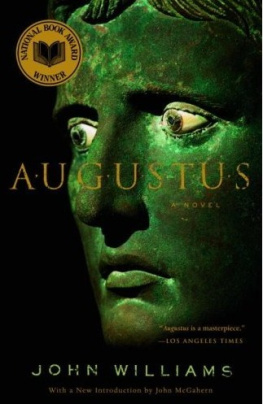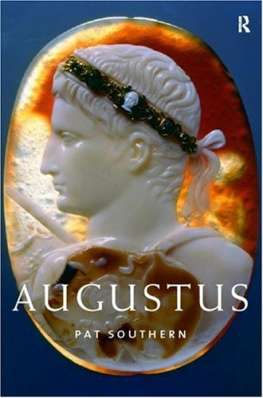John B. Firth - Augustus Cæsar
Here you can read online John B. Firth - Augustus Cæsar full text of the book (entire story) in english for free. Download pdf and epub, get meaning, cover and reviews about this ebook. year: 2017, publisher: Lume Books, genre: Detective and thriller. Description of the work, (preface) as well as reviews are available. Best literature library LitArk.com created for fans of good reading and offers a wide selection of genres:
Romance novel
Science fiction
Adventure
Detective
Science
History
Home and family
Prose
Art
Politics
Computer
Non-fiction
Religion
Business
Children
Humor
Choose a favorite category and find really read worthwhile books. Enjoy immersion in the world of imagination, feel the emotions of the characters or learn something new for yourself, make an fascinating discovery.
- Book:Augustus Cæsar
- Author:
- Publisher:Lume Books
- Genre:
- Year:2017
- Rating:3 / 5
- Favourites:Add to favourites
- Your mark:
- 60
- 1
- 2
- 3
- 4
- 5
Augustus Cæsar: summary, description and annotation
We offer to read an annotation, description, summary or preface (depends on what the author of the book "Augustus Cæsar" wrote himself). If you haven't found the necessary information about the book — write in the comments, we will try to find it.
Augustus Cæsar — read online for free the complete book (whole text) full work
Below is the text of the book, divided by pages. System saving the place of the last page read, allows you to conveniently read the book "Augustus Cæsar" online for free, without having to search again every time where you left off. Put a bookmark, and you can go to the page where you finished reading at any time.
Font size:
Interval:
Bookmark:
G. P. Putnams Sons 1903
G. P. Putnams Sons have asserted their rights under the Copyright, Design and Patents Act, 1988, to be identified as the author of this work.
First published in 1903 by G. P. Putnams Sons.
This edition published in 2017 by Endeavour Press Ltd.
There is, so far as I have been able to ascertain, no biography in English of Augustus a most curious fact when one considers the extraordinary success of his career and the enormous importance of the work which he accomplished. Perhaps the reason of this apparent neglect may be found in the circumstance that his character is one of the most puzzling of antiquity. The Emperor Julian compared him to a chameleon; Augustus himself signed his State papers with a ring bearing the device of a Sphinx. Both the man and his work remain a contradiction still; theory and practice in his case persistently refuse to be reconciled; one can rarely feel quite sure at any given point in Augustuss life that one knows exactly what he had in his mind. We know him best in the early portion of his career, when Cicero was still writing his incomparable letters and delivering his incomparable speeches. After Ciceros murder, the authorities become meagre and unsatisfactory. In this volume I have attempted to give a clear account of what Augustus achieved in the establishment of the Roman Empire, and at the same time to reveal the man, in so far as he reveals himself by his actions. Augustus does not belong to the category of the worlds great men who can be labelled with a single or a simple adjective.
This volume may be considered to some extent as a sequel to the earlier volume on Julius Csar in this series which was written by Mr. W. Warde Fowler. It also inevitably overlaps to a certain degree the volume on Cicero, written by Mr. J. L. Strachan-Davidson. I hope it may be found not wholly unworthy to take a place by the side of those two brilliant studies. My obligations to the innumerable scholars and historians who have worked and tilled the same ground before me are exceedingly great. For the earlier period I may specially mention the illuminative essays in the great Dublin edition of The Letters of Cicero; for the constitutional changes introduced by Augustus, Mr. A. H. J. Greenidges Roman Public Life; and for the provincial administration, Professor Mommsens well-known work, The Provinces of the Roman Empire.
J. B. F, LONDON, October, 1902.
When Julius Csar fell, pierced with twenty-three wounds, at the foot of Pompeius statue in the Senate House at Rome, the Roman world was left without a master. The conspirators had slain the one man strong enough to evolve order out of the chaos into which the Republic had been plunged. They had destroyed Csar, and with him they had hoped to destroy Csarism. But the sole result of their act of assassination was to throw the State for a period of thirteen miserable years into a constant succession of civil wars, out of which emerged, triumphant and alone, the commanding figure of Augustus, who shattered for ever the Roman Republic, and founded upon its ruins the majestic structure of the Empire. Yet not one of those who took part in the tragedy of the Ides of March, and not one of the leading statesmen of the day, seems to have given a passing thought to him who was to profit most by the crime which was then committed. Neither Brutus nor Csar, neither Antonius nor Lepidus, neither Cicero nor any of his associates, imagined that a youth who was pursuing his military studies at Apollonia was destined to set all their calculations at naught and to prove himself the ablest and strongest of them all. Octavius, however, does not enter upon the scene until a month after the assassination of his grand-uncle and adopted father, and it will be well, therefore, to describe in brief the course of events from the 15th of March, B.C. 44, down to the middle of April, when he returned to Italy.
It was a troubled and anxious time for all, but especially for the Republican chiefs. There is no occasion here to analyse the motives which had led Brutus, Cassius, and their fellow-conspirators to plot the assassination of Csar. They were men of widely different types; all had been generously treated by their victim, and most had been selected by him for high official posts. But it is important to lay stress upon their unanimous conviction that if only Julius were removed, the Republic might be restored upon its old footing, as it was prior to the outbreak of the civil war between Csar and Pompeius. They believed, in short, that the Roman people were at heart thoroughly devoted to the ancient constitution, and that, once Csar was put out of the way, the Senate would reassert its control of public affairs, and the oligarchical families, to which they themselves belonged, resume their wonted places in the State. But they had been rudely undeceived on the very day of the assassination. When they marched to the Forum from the Curia, waving their bloody daggers and crying out that they had slain the tyrant, they had been received with chilling silence. So far from being enthusiastically hailed as saviours of their country, the people held aloof from them; Csars veterans had raised menacing shouts, and Marcus Brutus himself was scarcely vouchsafed a hearing. Hence they had slunk back to the Capitol, glad of the security which the presence of the swordsmen of Decimus Brutus afforded them. It was but little compensation for their bitter disappointment that Cicero and a number of other Senators climbed the hill of the Capitol to congratulate them on their deed and join their councils.
There they spent in fruitless debate the hours which should have been devoted to strenuous and decisive action. Acting on the recommendation of Brutus, they had spared Marcus Antonius, Csars colleague in the consulship. Nor did they apprehend any danger from Lepidus, the Master of the Horse, who was just on the point of starting to take up his command in Gaul and Spain. They mistook their men. As soon as Antonius heard that Csar had fallen, he made himself secure in his house and opened communications with Lepidus, who assured him of support and moved a detachment of his troops into the city with orders to seize and hold the Forum. On the morning of the 16th, Antonius took steps to gain possession of Csars private papers and treasure, and laid hands upon the seven million sesterces which were stored in the Temple of Ops. The conspirators again harangued the people and again met with a frigid reception. Brutus declaimed against the tyranny of the dead usurper and boldly claimed the favour of his hearers on behalf of Sextus Pompeius and the banished defenders of the Republic. But there was no popular response, and he and his friends returned to the Capitol and there decided to treat with the Consul Antonius and request him to convene a meeting of the Senate for the following day.
The Senate, accordingly, met in the Temple of Tellus in the Carin and, surrounded by the cohorts of Lepidus, debated the question of the hour. The fate of Rome hung upon the decision that might be reached. The Liberators sought to obtain from the Senate a formal justification of their action, but dared not lay before the meeting the true alternative policies. A justification of the murder ought logically to have been accompanied by a reversal of Csars decrees and Csars official appointments. But they themselves held their appointments from Csar, and they had already recognised the succession of Dolabella, the Consul-designate, to the consulship which Csars murder had just made vacant. They had no soldiers at their command, except the gladiators of Decimus Brutus, while the city was full of Csars veterans, and the Forum was held by the troops of Lepidus, acting in concert with Antonius. The conspirators, therefore, realised the essential weakness of their position, and felt obliged to temporise, especially as they were suspicious of Antonius, though he spoke them fair and promised to co-operate with them in the task of restoring order and public confidence. They were, in fact, practically helpless; the control of events had passed into other hands than theirs. Consequently, after many hours of anxious debate, the Senate passed an act of general amnesty, but confirmed the decrees and appointments of the dead Dictator. This was plainly a confession of weakness on the part of all the contending parties. Each wanted time to form new combinations; each felt that the chance of immediate success was too precarious to put fortune to the test. Antonius, Lepidus, and Cicero all urged the same course to say nothing of the murder of Csar, to forget the past, and to begin again.
Font size:
Interval:
Bookmark:
Similar books «Augustus Cæsar»
Look at similar books to Augustus Cæsar. We have selected literature similar in name and meaning in the hope of providing readers with more options to find new, interesting, not yet read works.
Discussion, reviews of the book Augustus Cæsar and just readers' own opinions. Leave your comments, write what you think about the work, its meaning or the main characters. Specify what exactly you liked and what you didn't like, and why you think so.









